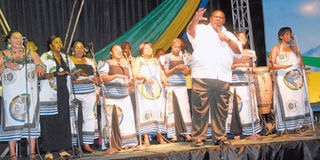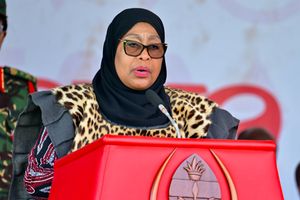Capt. Komba deserves a slot in the gallery

Captain John Komba during a performance with The Tanzania One Theatre (TOT) Group
What you need to know:
- His transformation from a school teacher, Choir master to military officer and later a politician is a story that shall be told for generations to come
Dar es Salaam. Tanzania mourns the demise of a major player on the political arena, Captain John Komba.
With the General Elections looming, his death is a double blow to the ruling CCM.
Through his inspirational and motivating political songs, he did the spadework for top leaders and four presidents since he became a choir master in 1978.
“He has sung for them all. He has sung for the ruling CCM, he has sung for the nation, but, sadly none will sing for him,” says Benno Villa Anthony, a musician with Mwanza-based Super Kamanyola.
Even when they finally sang for him at the memorial service at Karimjee Grounds there were no signs that he was listening. Benno served as TPDF Mwenge Jazz vocalist in 1978, when Captain John Komba joined theTPDF choir group.
According to Villa, both Mwenge Jazz and TPDF choir did a commendable job in motivating combatants during the war. Though at the time of his death many referred to Captain Komba as a politician there are some who disagree.
Former Dar International trumpeter, Ismail Issa, says he was only 20 per cent a politician and 10 per cent a TPDF soldier.
“The remaining 70 per cent puts him as an inspirational musician and an accomplished band manager,” says Ismail Issa.
He adds that Captain Komba joins a gallery of great musicians and inspirational composers and will remain irreplaceable.
“His style, approach and unique traditionally-guided singing have not produced disciples,” says Issa who now plays for Shikamoo Jazz Band.
Achimenengule campaign
Political and economic reforms that swept Africa in early 1990s, came along with the decline of state owned bands in Tanzania.
The situation was further complicated with an influx of Paris-Brussels polished Congolese music that was then spearheaded by Kanda Bongo Man, Pepe Kalle, Loketo Group and the then little known Koffi Olomide.
Captain John Komba as the executive director of Tanzania One Theatre (TOT) saw the Congolese threat and tried single-handedly to overcome it.
“If all musicians supported Captain Komba’s suggestion, I think Tanzania could have had one strong dance style long before the arrival of Bongo Flava,” says Mabruki Mohamed, a former TOT singer.
Captain Komba, who led the dance music band, the choir and taarab, thought it was prudent for Tanzanian bands to have an indigenous dance style to compete with the Congolese Ndombolo and others.
He suggested Achimenengule, which was then used by TOT band to be used other bands.
His suggestion met stiff opposition from youthful bands playing neo rumba with some even ridiculing him,“……..migulu baja migulu baja, haiwezi kucheza na sisi………” to mean they won’t dance with him.
Captain Komba had to employ one of the then youthful singers, Banza Stone from TOT’s rival group to counter-attack the offence.
Banza Stone responded in one ofTOT’s big hits, “eti Nyumba ya Shetaini mwendawazimu kaingiaje,….eti nyumba ya starehe tingatinga linaingiaje…”
“Captain Komba led TOT group, dance band and taarab to dominate the local music scene from the early 1990s to mid 2000s. Because of him we were able to see Khadija Kopa reign as the queen of modern taarab,” notes Police Jazz Band’s, Adelgot Haule. He adds: As the executive director of TOT, he offered more to our music than he did in politics.
Tanzania One Theatre (TOT) formed in 1992 is closely, or loosely associated with CCM.
Tanzania One Theatre has been performing various genres of music, including traditional, choir, taarab, and dance music.
During its peak of fame, TOT’s performance took place at Vijana Social Hall, a government establishment that often featured Vijana Jazz.
Located in Kinondoni, Dar es Salaam, the hall was a prominent feature in the country’s nightlife before other clubs sprouted in the area.
“I don’t expect TOT to regain its lost glory after Captain Komba, who was the group’s manager, band leader, composer and discipline master,” says Vijana Jazz’s Abdallah Mggonahazelu.
Master of traditional blue note
Captain John Komba is arguably the man who modernized a political choir by introducing electronic equipment.
As part of his modernization campaign he introduced the famed electric xylophone that became a feature in every song his group produced.
Some of his influence can now be found even in gospel music widely played in Tanzania today.
But music experts insist that his traditionally modelled blue note singing gave his political songs a hypnotizing power.
“I cried when I heard Komba singing sorrowfully during the death of Mwalimu in 1999. His singing was unique and mercurial,” recalls Evelyne Mabula, 52.
Explaining further on Komba’s inspiration, Police Jazz band master, Adellgot Haule says Captain Komba borrowed a lot from Ligwamba folk music from the Ngoni and Pangwa tribes in southern Tanzania.
“Captain Komba could well express sorrow in his singing because he was influenced by funeral music called Ligwamba and Lizombe for up tempo singing. It is a rare innovation that musicians of the present generation hardly attain,” says Haule.
Haule and other veteran musicians believe that music suffered the most from Captain Komba’s death than the politics he served in the later days of his life.
From teaching to military officer
Born in 1954, Captain Komba joined Lituhi Primary School in 1963. After completing Standard Seven in 1970, he joined Songea Boys Secondary School which he completed in 1974, then joined Kleruu Teachers Training College where he obtained a teaching certificate in 1976.
In 1978 he joined Monduli Military Cadet Training Unit in Arusha where he got a diploma, and then studied at Magdeburg Path in Germany from where he received a diploma in politics.
Captain Komba later joined Washington International University in 2006, where he was awarded a BA in political science in 2008.
Captain Komba served in the Tanzania People’s Defence Forces as an Army Officer between 1978 and1992.
Previously he had been employed by the Ministry of Education (1977 and 1978).
Between 1992 and 2005 Captain Komba was TOT Executive Director, doubling also as CCM Chief of Culture from 1992 to date. He served as Mbinga West MP from 2005, and also as member of CCM’s National Executive Committee (NEC) from 1987 until his death
Komba died on 28 February 2015 at TMJ Hospital in Dar es Salaam, where he had been admitted few hours earlier.




